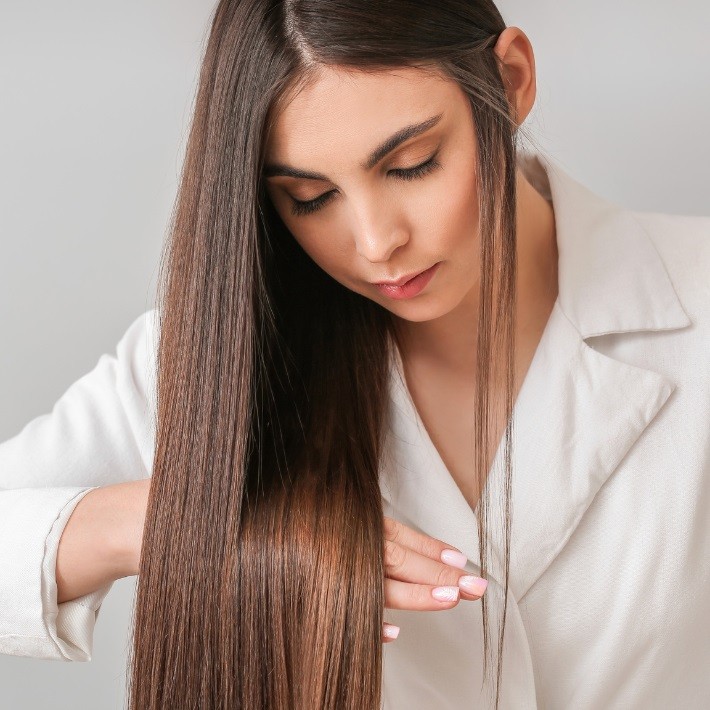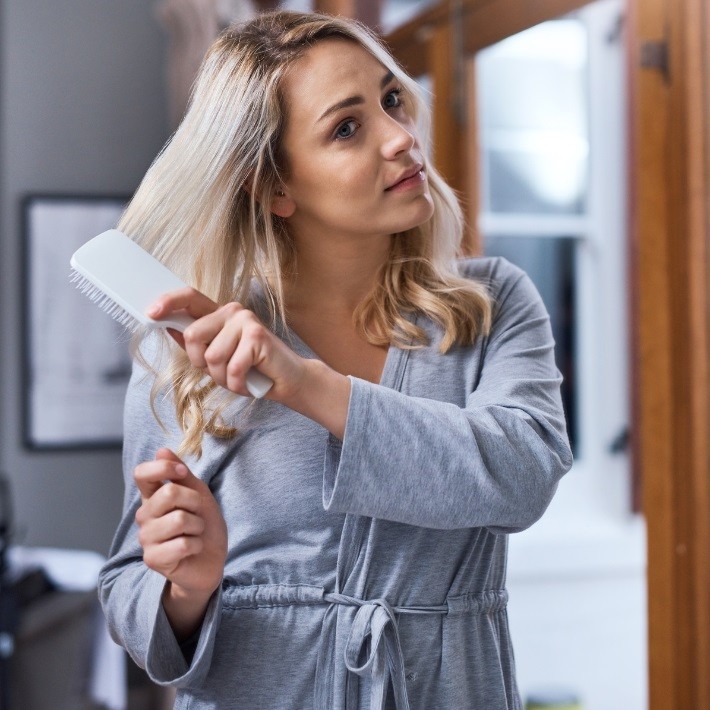Last Updated on March 28, 2025
You can tone your hair every 4 to 6 weeks for maintenance. Toning your hair is a process to adjust or neutralize any unwanted tones in your dyed hair.
For instance, you can use toning to neutralize warmth in blonde hair or add cool tones to gray hair. It’s important to keep in mind that too much toning can damage your hair. The frequency of toning will depend on the hair’s condition, the chosen shade, and the desired result.
Understanding the difference between toning and dying is crucial to achieving your desired look while maintaining the health of your locks. We will discuss everything you need to know about hair toning and how to incorporate it into your haircare routine.
Importance Of Toning Hair Regularly

Toning hair is a process that involves removing undesired tones from the hair and achieving a vibrant, radiant look. While most people think they only need to tone their hair once, it’s essential to understand that toning hair regularly is crucial in maintaining healthy, shiny, and damage-free hair.
In this section, we will look at the science behind the process of hair toning, the importance of toning hair regularly, the benefits of regular toning, and the hair types that need regular toning.
Related: How Often Should You Use A Hair Mask?
The Science Behind The Process Of Toning
Toning hair involves either depositing color or neutralizing unwanted brassy tones in the hair. When hair is bleached or dyed, it is stripped of color, making it more susceptible to yellow or orange tones. Toners contain chemical dyes or pigments that neutralize these tones, creating a cool, toned look.
Toning hair regularly is essential in maintaining hair color and vibrancy. It helps remove unwanted tones caused by heat styling, sun damage, and environmental pollutants. By toning regularly, you prevent the buildup of unwanted tones and maintain consistent hair color.
Moreover, regular toning provides an opportunity to adjust the tone to your preference and add depth to your hair color.
Benefits Of Toning Hair Regularly
Regular toning has various benefits, including:
- Shinier hair: Toning helps to close the hair cuticle, reducing the appearance of split ends, and creating a smoother hair texture, resulting in shinier hair.
- Healthier-looking hair: Toning removes unwanted tones and creates a more natural appearance, making hair look healthier.
- Reduced damage: Toning reduces the need for excessive heat styling or coloring, preventing potential damage to your hair.
Best Hair Types That Need Regular Toning
While toning is suitable for most hair types, some hair types require more frequent toning than others. These include:
- Bleached hair: Bleached hair is more prone to yellow or orange tones. Therefore, those with bleached hair may need to tone their hair every 4-6 weeks.
- Grey hair: Grey hair tends to be yellow over time, making it appear dull and lifeless. Regular toning helps to maintain an even and polished grey color.
- Ash or cool-toned hair: Ash or cool-toned hair is more prone to fading and changing colors. Regular toning helps retain the ash or cool tones, keeping the hair looking fresh and vibrant.
Toning your hair regularly is vital for maintaining healthy, shiny, and vibrant hair. It helps to prevent damage, reduces the appearance of split ends, and creates a more polished look. By regularly toning your hair, you’ll achieve a consistent hair color that complements your skin tone and enhances your natural beauty.
Frequency Of Toning Based On Hair Type And Color
How Often Can You Tone Your Hair?
Do you want to maintain the perfect hair color for a long time? Toning might be the solution you need. Toning is a process of neutralizing unwanted undertones and maintaining the desired hair color. But how often should you tone your hair?
Let’s find out.
Different types and colors of hair require different levels of maintenance. It’s essential to know how often to tone your hair based on your hair type and color. Here are some guidelines to help you:
Frequency Of Toning For Different Hair Types
- Curly hair: Approximately every six to eight weeks
- Straight hair: Approximately every six to eight weeks
- Thick hair: Approximately every eight to ten weeks
- Thin hair: Approximately every four to six weeks
- Dry hair: Approximately every six to eight weeks
- Oily hair: Approximately every four to six weeks
How Often Should You Tone Your Hair According To Your Natural Hair Color?
- Blonde hair: Approximately every four to six weeks
- Brunette hair: Approximately every six to eight weeks
- Red hair: Approximately every eight to ten weeks
Effect Of Previous Hair Treatments On Toning Frequency
If you have undergone previous hair treatments such as bleaching or coloring, the frequency of toning may vary. Here are some guidelines to follow:
- Bleaching: Toning is recommended every four to six weeks
- Coloring: Toning is recommended every six to eight weeks
- Relaxing: Toning is recommended every ten to twelve weeks
Tips For Prolonging The Toning Effect And Reducing The Need For Frequent Toning
Toning can be a time-consuming and expensive process. There are ways to prolong the toning effect and reduce the need for frequent toning. Here are some tips:
- Use sulfate-free shampoos and conditioners
- Use a color-safe hair mask once a week
- Avoid exposing your hair to direct sunlight for prolonged periods
- Towel-dry your hair gently after washing
- Avoid using hot styling tools too frequently
Common Mistakes To Avoid While Toning Hair
Toning hair can be tricky. Therefore, it’s essential to avoid common mistakes while toning your hair. Here are some of the most common mistakes to avoid:
- Leaving the toner on for too long
- Using the wrong toner shade
- Overprocessing the hair
- Using harsh, sulfate-containing shampoos
- Using hot styling tools immediately after toning
By understanding your hair type, natural color, previous hair treatments and practicing proper hair care, you can determine the appropriate frequency of hair toning.
Related: How to Use Kerastase Hair Masks?
Diy Toning And Professional Toning Services

How often can you tone your hair? That’s a question asked by many people who have dyed their hair. Toning is a crucial part of hair maintenance that helps to neutralize unwanted tones in your dyed hair. Toning can be done at home or by a professional salon.
In this blog post, we’ll look at the pros and cons of diy toning methods, as well as professional toning services, and provide a step-by-step guide to help you tone your hair at home.
Pros And Cons Of DIY Toning Methods
There are several pros and cons of diy toning methods that you should consider before choosing to apply toner at home. Here are some of the key benefits and drawbacks:
Pros
- It’s less expensive than going to a salon.
- You have total control over the process.
- You can do it on your own time, at home.
- You can use products that you already have on hand.
Cons
- It can be messy.
- It’s easier to make a mistake.
- It may not turn out the way you want it to.
- It may not last as long as professional toning.
Step-By-Step Guide To Toning Your Hair At Home
Toning your hair at home is possible, but it requires careful attention to detail. Here’s a step-by-step guide to help you get the best results:
- Choose the right toner: Select a toner shade that complements your hair color. Consider using a color wheel to find the opposite color of the hue you want to neutralize.
- Mix the toner: Follow the instructions on your toner bottle to mix the toner with the developer.
- Apply the toner: Section your hair and carefully apply the toner mixture using a brush to ensure complete coverage. Avoid applying it to your scalp.
- Wait: Leave the toner on for the recommended amount of time, which is usually about 30 minutes.
- Rinse: Rinse your hair thoroughly with warm water until the water runs clear.
- Condition: Apply a deep conditioner or hair mask to help restore moisture to your hair.
Recommended Products For Diy Toning
Many toning products are available in the market. Here are some examples of toner and developer brands that you can use for DIY toning:
- Wella color charm toner
- Clairol professional soy4plex liquicolor permanente
- Ion color brilliance bright white creme lightener
- L’oreal quick blue powder bleach
- Salon care 30 volume creme developer
- Schwarzkopf blondme bond enforcing premium lightener
Professional Toning Services – What To Expect And The Benefits
If you want a professional toning service, here’s what you can expect:
- A salon specialist will analyze your hair and recommend the best toners for your hair type and color.
- They will use high-quality, professional-grade products that are not available over the counter.
- The process will be customized according to your hair needs.
- You will receive personalized advice on how to maintain your hair color and keep it looking vibrant.
- You will likely get longer-lasting results that are more uniform than diy toning.
Types Of Professional Toning Services Available
There are several professional toning services available. Here are some examples:
- Balayage toning: Balayage is a highlighting technique that gives your hair a natural look, and toning is added to adjust the color.
- Foilayage toning: Foilayage is similar to balayage, but foils are used to lighten your hair, and then toner is applied for color correction.
- Glazing services: This is a type of clear gloss that adds shine, tone, and color protection.
- Root toning: This service is used to adjust new hair growth after coloring.
How To Choose The Right Toning Service Provider For Your Hair?
Choosing the right toning service provider is essential to getting the results you want. Here are some things to keep in mind when choosing a professional salon:
- Check the salon’s online reviews and reputation.
- Look for a specialist who has experience with your hair type and color.
- Consider the cost and location of the salon.
- Check their availability and make an appointment as needed.
Whether you choose to tone your hair at home or opt for a professional service, it’s critical to take good care of your hair. You can maintain your hair color by using a sulfate-free shampoo, avoiding heat styling, and regularly using hair masks and conditioners.
With the right products and tips, you can keep your hair looking vibrant and healthy for longer!
Related: Can You Leave A Hair Mask On Overnight?
Frequently Asked Questions Of How Often Can You Tone Your Hair?
How Often Should You Tone Your Hair?
The frequency of toning hair depends on hair type, shampoo usage, and color maintenance routine.
Is It Bad To Tone Your Hair Too Often?
Yes, toning hair frequently can damage hair, cause breakage, split ends, and dryness.
What Happens When You Tone Your Hair?
Toning helps to neutralize brassy tones, adds shine, and creates an even hair color.
Can You Tone Your Hair Right After Coloring?
No, wait for at least two weeks before toning your hair after coloring to avoid hair damage.
Can I Tone My Hair At Home?
Yes, you can tone your hair at home but be careful to follow the instructions and use the right products.
Conclusion
It’s important to remember that toning your hair doesn’t always have to involve harsh chemicals. There are several natural ways to tone your hair, such as using coffee or chamomile tea. If you choose to use toner, it’s recommended to wait at least four weeks between each treatment to prevent damage to your hair.
Whether toning to enhance your highlights or neutralize brassiness, it’s important to take proper care of your hair before and after treatment. This includes using a quality conditioner to keep your hair hydrated and avoiding heat styling tools. Remember, your hair health should always be a top priority.
So the next time you feel like toning your hair, take a moment to ask yourself if it’s truly necessary and what steps you can take to protect your precious locks.

